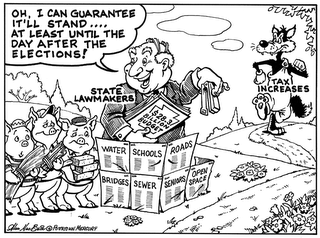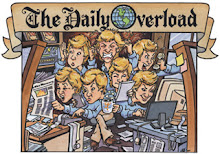Newspapers are on to something
Newspaper editors are on to something.
And, it's important.
It is that what happens in Harrisburg has more to do with your lives than what happens in Washington, D.C., or even in Pottstown or Spring-Ford, and more often than not, what happens in Harrisburg is not good for you.
The state capital is where the Legislature does business, and that business determines the taxes you pay -- including the onerous property tax bill that comes from your local school district -- the traffic you face, potholes you endure, and job opportunities you don't have.
Some newspaper editors have been on to the racket going on in Harrisburg for some time. (See my colleague Tony's blog for an eyeful ... )Others are just catching up. Editors at Pennsylvania's mid-size dailies have come to realize that being the watchdog of our local school boards and borough councils is not enough. The real stuff -- tax reform, attracting new business, fixing roads and bridges, restoring train service to our towns -- depends on state legislative action.
Editorial writers throughout the Commonwealth are taking note that there's more talk and more wasteful spending than there is action on the state front. The Mercury was among the first of newpapers to pick up on the brazen legislative vote now known as the pay-raise fiasco. Our campaign in the summer of 2005 to "send a message to Harrisburg" proved beyond a doubt that residents of our towns understand that actions an hour's drive up the turnpike make a big difference right here.
We have criticized, cajoled and chastized state lawmakers, but our drumb eat of editorial opinions has not made much of a dent. We have printed so many cartoons on state government drawn by free-lance artist Alan MacBain that the lawmaker featured has his own identity. We call him Rep. Harry Combover.
eat of editorial opinions has not made much of a dent. We have printed so many cartoons on state government drawn by free-lance artist Alan MacBain that the lawmaker featured has his own identity. We call him Rep. Harry Combover.
Pennsylvania has the most expensive state governing body in the nation -- spending an appalling $340 million a year while everyone else slashes expenses and tries to make ends meet.
The theme of legislative glut is catching on among newspapers throughout the state. We frequently print shared views, some from our sister papers in the Journal Register News Service and others from The Associated Press, that demonstrate other voices are joining in the protest against legislative spending.
The Scranton Times-Tribune recently published a three-part series on the topic, and the Harrisburg Patriot-News does an outstanding job of uncovering legislative foibles and waste.
Several years ago, the Opinion page in a newspaper like The Mercury was the domain of local issues only. But, in recent years, with the outcry for property tax reform amid skyrocketing school taxes, we have made it our job to lead the charge for a more efficient Legislature in Harrisburg -- a group that does the job of governing, reforming laws, and improving the quality of life in Pennsylvania.
Pennsylvania's Legislature is big, expensive and ineffective. Newspapers have figured out that what's wrong in state government affects what's right in communities. Change will only occur when voters figure it out, too.
And, it's important.
It is that what happens in Harrisburg has more to do with your lives than what happens in Washington, D.C., or even in Pottstown or Spring-Ford, and more often than not, what happens in Harrisburg is not good for you.
The state capital is where the Legislature does business, and that business determines the taxes you pay -- including the onerous property tax bill that comes from your local school district -- the traffic you face, potholes you endure, and job opportunities you don't have.
Some newspaper editors have been on to the racket going on in Harrisburg for some time. (See my colleague Tony's blog for an eyeful ... )Others are just catching up. Editors at Pennsylvania's mid-size dailies have come to realize that being the watchdog of our local school boards and borough councils is not enough. The real stuff -- tax reform, attracting new business, fixing roads and bridges, restoring train service to our towns -- depends on state legislative action.
Editorial writers throughout the Commonwealth are taking note that there's more talk and more wasteful spending than there is action on the state front. The Mercury was among the first of newpapers to pick up on the brazen legislative vote now known as the pay-raise fiasco. Our campaign in the summer of 2005 to "send a message to Harrisburg" proved beyond a doubt that residents of our towns understand that actions an hour's drive up the turnpike make a big difference right here.
We have criticized, cajoled and chastized state lawmakers, but our drumb
 eat of editorial opinions has not made much of a dent. We have printed so many cartoons on state government drawn by free-lance artist Alan MacBain that the lawmaker featured has his own identity. We call him Rep. Harry Combover.
eat of editorial opinions has not made much of a dent. We have printed so many cartoons on state government drawn by free-lance artist Alan MacBain that the lawmaker featured has his own identity. We call him Rep. Harry Combover.Pennsylvania has the most expensive state governing body in the nation -- spending an appalling $340 million a year while everyone else slashes expenses and tries to make ends meet.
The theme of legislative glut is catching on among newspapers throughout the state. We frequently print shared views, some from our sister papers in the Journal Register News Service and others from The Associated Press, that demonstrate other voices are joining in the protest against legislative spending.
The Scranton Times-Tribune recently published a three-part series on the topic, and the Harrisburg Patriot-News does an outstanding job of uncovering legislative foibles and waste.
Several years ago, the Opinion page in a newspaper like The Mercury was the domain of local issues only. But, in recent years, with the outcry for property tax reform amid skyrocketing school taxes, we have made it our job to lead the charge for a more efficient Legislature in Harrisburg -- a group that does the job of governing, reforming laws, and improving the quality of life in Pennsylvania.
Pennsylvania's Legislature is big, expensive and ineffective. Newspapers have figured out that what's wrong in state government affects what's right in communities. Change will only occur when voters figure it out, too.
 RSS
RSS



0 Comments:
Post a Comment
<< Home